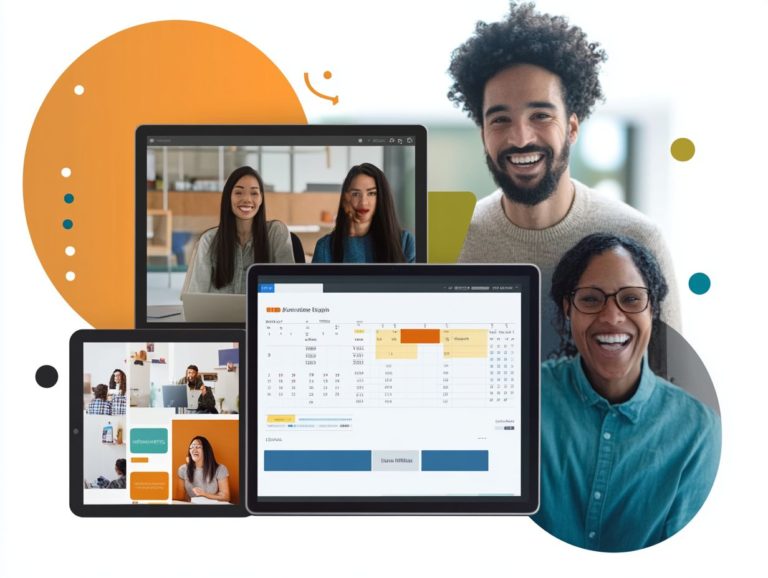The Role of Soft Skills in Employee Onboarding
In today s competitive job market, effective employee onboarding has become more crucial than ever. It establishes the tone for a new hire’s experience and success within your organization.
However, it’s not solely about training on tools and processes; integrating soft skills into the onboarding process can create a transformative impact.
This article delves into the significance of soft skills, their influence on onboarding, and how to incorporate and measure them effectively.
By the end, you ll discover powerful strategies to transform your onboarding programs, ensuring that new employees not only fit in but truly thrive.
Contents
- Key Takeaways:
- The Importance of Employee Onboarding
- What are Soft Skills?
- The Impact of Soft Skills in Onboarding
- Integrating Soft Skills into Onboarding Programs
- Measuring the Effectiveness of Soft Skills in Onboarding
- Best Practices for Developing Soft Skills in Onboarding
- Frequently Asked Questions
- What are soft skills and how do they impact employee onboarding?
- Why is it important for employers to prioritize soft skills during the onboarding process?
- How can employers assess soft skills during the employee onboarding process?
- What are some examples of soft skills that are crucial for successful onboarding?
- Can soft skills be developed and improved upon during the onboarding process?
- What are the long-term benefits of focusing on soft skills during onboarding?
Key Takeaways:

- Effective onboarding is crucial for employee success, and soft skills play a crucial role in this process.
- Soft skills refer to personal attributes such as communication, teamwork, and adaptability, which are essential for workplace success.
- Integrating soft skills training into onboarding programs can help new employees develop the necessary skills for success and improve retention rates.
The Importance of Employee Onboarding
Employee onboarding stands as a cornerstone of any successful HR career, playing a vital role in seamlessly integrating early-stage employees into the organization. This process builds a supportive community where everyone can thrive and enriches the overall employee experience.
When you implement a well-structured onboarding program, you can dramatically enhance employee retention, elevate job performance, and nurture crucial skills like effective communication and adaptability.
By placing emphasis on cultural competency and performance management, you can design programs that resonate with the best practices championed by HR leaders and the Society for Human Resource Management.
Why Onboarding is Important for Employee Success
Onboarding is important for your success, as it lays the groundwork for effective communication, problem-solving, and teamwork, allowing you to thrive in a diverse environment, no matter your background.
By leveraging innovative HR software, you can streamline your onboarding process, enabling new employees to self-regulate and cultivate emotional intelligence right from the start. This approach helps newcomers acclimate to their roles and fosters a genuine sense of belonging in a diverse workplace. A thoughtfully crafted onboarding experience can dramatically enhance retention rates by addressing individual needs within the framework of an inclusive company culture.
Incorporating this technology into your onboarding processes shows your commitment to nurturing employee growth and ensuring their long-term success.
What are Soft Skills?
Soft skills, often dubbed power skills, encompass a rich array of abilities such as interpersonal skills, adaptability, emotional intelligence (the ability to understand and manage your own emotions and those of others), and critical thinking. Mastering these skills is essential for effectively navigating workplace challenges and elevating your overall job performance.
Defining and Understanding Soft Skills
Defining soft skills means acknowledging their vital role in cultivating effective communication, teamwork, and emotional intelligence within the workplace.
These skills are not just crucial for your individual success; they also play a key part in creating a friendly workplace that enhances productivity and sparks creativity. For example, when you practice active listening, you enable your team members to engage in meaningful discussions, paving the way for collaborative problem-solving. Showing empathy builds stronger relationships. This makes delivering constructive feedback less intimidating and more impactful.
In real-world scenarios, a manager who uses conflict resolution skills quickly addresses disagreements, turning potential disruptions into valuable opportunities for growth and learning. Adaptability enables you to navigate the ever-shifting dynamics of modern workplaces, ensuring you remain both relevant and effective in your role.
The Impact of Soft Skills in Onboarding

The significance of soft skills in the onboarding process cannot be overstated. These essential skills are pivotal in facilitating how employees fit in, ultimately leading to positive outcomes like improved job performance and enhanced teamwork within your organization. For more insights, consider using onboarding software effectively.
How Soft Skills Contribute to Successful Onboarding
Soft skills play a crucial role in your onboarding experience. They help you adapt swiftly, engage meaningfully with colleagues, and foster a sense of teamwork. This sets you up for a smooth and exciting transition into your new role.
These skills enhance immediate interactions and establish a foundation for long-term collaboration and innovation within the team. When you possess a high degree of emotional intelligence, you re better equipped to navigate the social intricacies of a new workplace, adeptly recognizing cues and responding with empathy.
Embracing adaptability allows you to tackle change and challenges head-on, which are parts of any position. Organizations that prioritize a soft skills assessment during the recruitment process can identify candidates who will not only mesh well with the company culture but also thrive in dynamic environments.
This foresight ensures a cohesive and productive team right from day one.
Integrating Soft Skills into Onboarding Programs
Integrating soft skills into your onboarding programs is crucial for creating a comprehensive employee experience. This approach equips new hires with the essential competencies needed to excel in their roles and promotes seamless integration into the company culture, reflecting the role of technology in employee onboarding.
By prioritizing these skills, you set the stage for their success and contribute to a more cohesive workplace environment. Act now to integrate soft skills into your onboarding. Doing so will transform your new hires experience and boost productivity!
Engaging Strategies for Effective Soft Skills Training
Effective strategies for incorporating soft skills training into your onboarding process involve employing engaging methodologies and utilizing HR tools that help manage employee information and training to monitor progress and outcomes.
By integrating interactive workshops, role-playing scenarios, and peer feedback sessions, you can cultivate a dynamic learning environment that promotes collaboration and communication. Employee engagement analytics will be your ally, helping you track participation rates and assess overall satisfaction levels with the training.
For example, onboarding specialists can harness real-time data to pinpoint which elements of the program resonate most with new hires, enabling timely adjustments as needed. This targeted approach enhances the onboarding experience for your team and equips employees to tackle future challenges, ultimately fostering a more cohesive workplace culture.
Measuring the Effectiveness of Soft Skills in Onboarding
Measuring the effectiveness of soft skills during onboarding requires you to utilize a range of assessment tools and data analysis methods. This approach allows you to evaluate employee experience, performance management, and the influence of feedback skills effectively.
Methods for Evaluating the Impact of Soft Skills Training

Evaluating the impact of soft skills training requires your attention to performance metrics and the implementation of effective feedback mechanisms to assess employee engagement and overall effectiveness.
This means you should measure not only immediate post-training outcomes but also track long-term behavioral changes and their correlation with productivity. By employing specific performance metrics, you can gauge how well employees are applying their newly acquired skills in real-world scenarios.
Leveraging real-time feedback enables you, as a manager or trainer, to fine-tune the training process. Regular check-ins and assessments further reinforce the training’s relevance, allowing you to identify areas for improvement and adjust future training efforts accordingly.
Best Practices for Developing Soft Skills in Onboarding
Implementing best practices for developing soft skills during onboarding is crucial for cultivating a workforce that excels in teamwork, emotional intelligence, and effective communication. Prioritizing these skills from the outset sets the stage for a dynamic and cohesive team that can navigate challenges with ease and foster positive relationships.
Tips for Cultivating Soft Skills in New Employees
Cultivating soft skills in new employees enhances their adaptability and relationship-building abilities. This ensures they are well-prepared to navigate workplace complexities effectively.
These important skills are essential for personal growth and for fostering a more cohesive team environment. Implementing mentoring programs that pair new hires with seasoned colleagues can ignite collaboration and growth among your team! This encourages open communication and constructive feedback.
Engaging in team-building exercises can further help cultivate a sense of camaraderie and trust among team members.
Workshops focused on emotional intelligence defined as the ability to understand and control one s emotions and the emotions of others can equip employees with the tools to manage their feelings while fostering empathy towards others. This paves the way for stronger interpersonal connections in the workplace, ultimately enhancing overall team dynamics.
Frequently Asked Questions
What are soft skills and how do they impact employee onboarding?
Soft skills are personal attributes and traits that enable individuals to effectively communicate, collaborate, and work with others. They play a significant role in employee onboarding by creating a positive work environment that promotes teamwork and productivity.
Why is it important for employers to prioritize soft skills during the onboarding process?

Prioritizing soft skills during onboarding allows employers to lay a strong foundation for their employees and promote a positive company culture. It helps ensure that new hires can effectively communicate and collaborate with colleagues, leading to a more cohesive and productive team.
How can employers assess soft skills during the employee onboarding process?
Employers can assess soft skills through various methods such as conducting behavioral interviews, using personality assessments, and observing how candidates interact with others during group activities or team-building exercises.
What are some examples of soft skills that are crucial for successful onboarding?
Examples of soft skills crucial for successful onboarding include communication, teamwork, adaptability, problem-solving, and time management. These skills help employees navigate their new role, collaborate with colleagues, and contribute to the company’s overall success.
Can soft skills be developed and improved upon during the onboarding process?
Yes, soft skills can be developed and improved during onboarding. Employers can provide training and resources for new hires to enhance their skills while fostering a supportive and collaborative work environment that encourages the use and development of these skills.
What are the long-term benefits of focusing on soft skills during onboarding?
The long-term benefits of focusing on soft skills during onboarding include improved employee retention, increased productivity and efficiency, and a positive work culture. By investing in developing soft skills, employers create a strong and cohesive team essential for the growth and success of the company.






